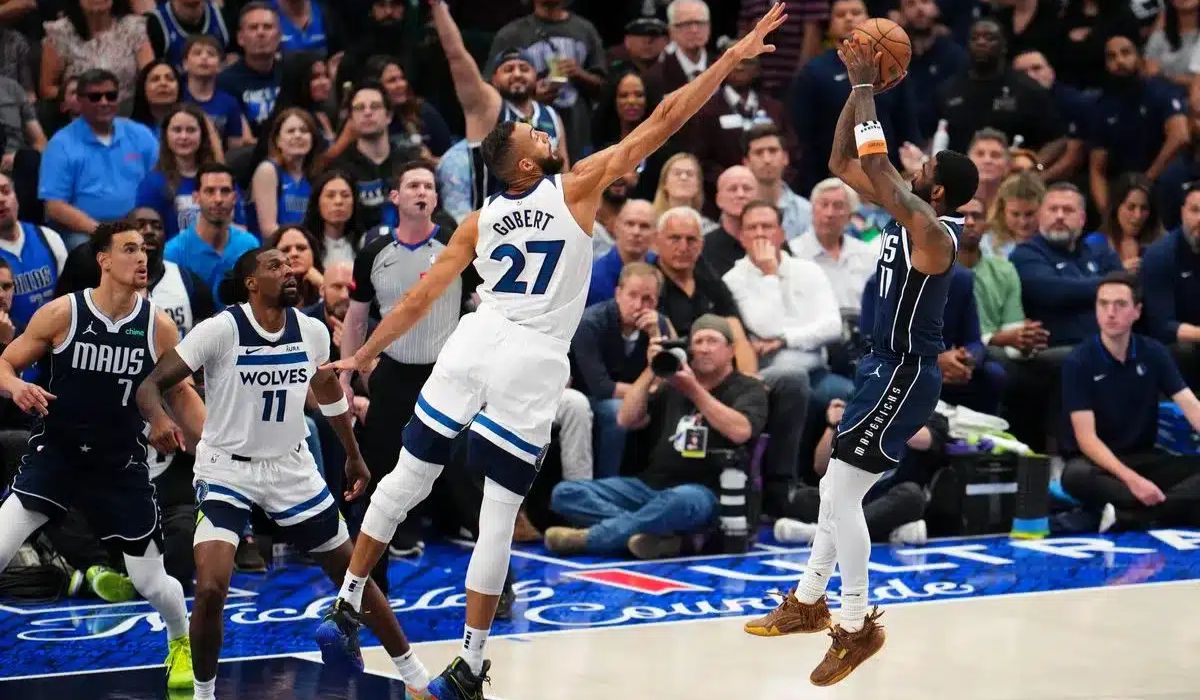Top Player Stats from the Dallas Mavericks vs Timberwolves Match
The Dallas Mavericks vs Timberwolves matchup is always a thrilling contest, featuring star players on both sides battling for supremacy. In every game, individual player performances can often be the deciding factor, and this game was no exception. Let’s dive into the standout performances from both teams, analyzing key player statistics and their impact on the outcome of the game.
Luka Dončić: The Mavericks’ Leader
Luka Dončić continues to prove why he’s one of the brightest stars in the NBA. In the game against the Timberwolves, Dončić displayed his all-around game with an impressive stat line of 30 points, 12 rebounds, and 8 assists. His versatility was on full display as he managed to score efficiently while also facilitating for his teammates.
Dončić’s performance was pivotal in creating offensive opportunities for the Mavericks, particularly in the second half, when he took control of the game and sparked a key run. His rebounding, especially on the defensive end, helped the Mavericks limit the Timberwolves’ second-chance opportunities. With his playmaking ability, Dončić continues to show that he’s not just a scorer but also a complete player capable of leading his team to victory.
Kyrie Irving: A Strong Complement to Dončić
While Luka Dončić shined as the primary playmaker, Kyrie Irving was the perfect complement, contributing with 26 points, 5 assists, and 3 rebounds. Irving’s ability to score both inside and from the perimeter stretched the Timberwolves’ defense, creating more space for Dončić to operate. His clutch shooting in the fourth quarter was crucial in maintaining the Mavericks’ lead. These Dallas Mavericks vs Timberwolves match player stats demonstrate how Irving’s versatile scoring and timely performances were essential to the Mavericks’ success.
Irving’s playmaking also stood out, as he was able to create opportunities for others, setting up open shots and orchestrating the offense when Dončić was on the bench. Irving’s quickness and ball-handling allowed him to break down the Timberwolves’ defense, keeping the pressure on throughout the game.
Karl-Anthony Towns: The Timberwolves’ Pillar
On the Timberwolves’ side, Karl-Anthony Towns was the standout performer. Towns finished with 28 points and 14 rebounds, showcasing his dominance in the paint. His ability to stretch the floor with his shooting and protect the rim on defense made him a constant threat.
Towns’ offensive contribution was critical in keeping the Timberwolves competitive throughout the game, particularly in the first half, when he was scoring efficiently and pulling down crucial rebounds. His ability to knock down outside shots, including three-pointers, helped open up the floor for his teammates. Defensively, Towns was able to anchor the Timberwolves’ frontcourt, but the Mavericks’ size and pace often overwhelmed him in the second half.
Anthony Edwards: Scoring and Defense
Another key player for the Timberwolves was Anthony Edwards, who scored 23 points and grabbed 6 rebounds. Edwards’ athleticism and ability to drive to the basket were on full display as he attacked the rim relentlessly. His scoring runs in the middle of the game helped the Timberwolves stay in contention, though he struggled with consistency at times.
Edwards’ defense also played a role in the matchup, as he tried to contain both Dončić and Irving. However, he faced challenges against the Mavericks’ skilled offensive players, as their experience and versatility made it tough for Edwards to have a lasting impact defensively.
Rebounding and Defensive Stats: The Game’s X-Factor
While individual scoring performances were key in this matchup, rebounds and defense played a crucial role in determining the winner. The Mavericks out-rebounded the Timberwolves by a margin of 45 to 37, with Dončić and the rest of the team collectively stepping up on the glass.
The Mavericks’ ability to control the boards limited the Timberwolves’ second-chance points, while the Timberwolves’ struggles to box out allowed the Mavericks to secure important offensive rebounds, which led to more scoring opportunities. The defensive schemes of both teams also had a significant impact on the pace of the game, with each team trying to disrupt the other’s rhythm.
Key Bench Contributions
While the star players dominated the headlines, bench players also had a meaningful impact. For the Mavericks, players like Tim Hardaway Jr. provided valuable scoring with 14 points off the bench. His shooting helped maintain the lead when the starters were resting. For the Timberwolves, Jaden Ivey provided a spark with 10 points, contributing valuable minutes in the second quarter.
Overall, the Dallas Mavericks vs Timberwolves matchup showcased the importance of individual player stats and how they can influence the outcome of the game. With standout performances from the likes of Dončić, Irving, Towns, and Edwards, the game proved to be a high-intensity battle where each team’s star players left their mark. These player stats were not just numbers; they told the story of the game, demonstrating how individual brilliance can change the course of a match.
Game-Changing Moments: The Stats Behind the Mavericks vs Timberwolves Victory
In every basketball game, there are pivotal moments where the flow of the game can suddenly shift. In the Dallas Mavericks vs Timberwolves matchup, it was the key statistical moments that turned the tide and ultimately determined the winner. From clutch performances to game-changing defensive plays, the stats tell the story of how momentum swung in favor of one team, influencing the outcome in ways beyond just scoring.
The Early Lead and Mavericks’ Scoring Runs

The game started with both teams trading baskets, but it wasn’t until the Mavericks unleashed a 10-0 scoring run late in the first quarter that they seized control. This quick burst was driven by Luka Dončić, who scored 6 of those 10 points, including a deep three-pointer that seemed to rattle the Timberwolves’ defense. During this stretch, the Mavericks also locked down defensively, forcing the Timberwolves into a series of bad shots.
The first-quarter stats reflected the importance of this momentum swing: the Mavericks shot 50% from the field in the first 12 minutes, while the Timberwolves struggled, shooting just 42%. The scoring run, combined with the Mavericks’ improved shooting efficiency, gave them a crucial lead that they would carry into the second half.
Clutch Performances in the Fourth Quarter
As the game entered the final stretch, the Timberwolves tried to claw their way back, with key players like Karl-Anthony Towns and Anthony Edwards stepping up to close the gap. However, it was Kyrie Irving’s clutch performance in the fourth quarter that truly sealed the victory for the Mavericks.
Irving scored 12 points in the final period, including a critical 3-pointer with just under 3 minutes remaining that pushed the Mavericks’ lead to 8 points. His ability to create his own shot and finish under pressure became evident when the Timberwolves, despite several defensive stops, couldn’t counter Irving’s offensive efficiency. In this stretch, Irving’s shooting percentage rose to 60%, making him virtually unstoppable in clutch moments. These Dallas Mavericks vs Timberwolves match player stats showcase how Irving’s performance in the final period was a key factor in securing the Mavericks’ victory.
This fourth-quarter surge was the defining game-changing moment. The stats show that Irving’s points came at crucial junctures, and his efficiency helped the Mavericks build a cushion that the Timberwolves couldn’t overcome.
Defensive Plays that Shifted the Game
While the Mavericks’ offense was key to their victory, their defense was just as critical in halting the Timberwolves’ momentum during key moments. A prime example came midway through the third quarter when the Timberwolves were closing in on the Mavericks’ lead. With just under 7 minutes left, the Timberwolves had reduced the deficit to just 4 points.
That’s when the Mavericks turned up their defensive pressure. A steal by Dončić, followed by a fast break assist to Tim Hardaway Jr. for a three-pointer, pushed the lead back to 7. This sequence shifted the momentum back to the Mavericks, and from that point onward, the Timberwolves were unable to sustain their offensive runs.
The defensive stats during this period show a remarkable shift: the Mavericks recorded 3 steals and forced 2 turnovers within a 4-minute stretch. This defensive activity disrupted the Timberwolves’ rhythm, forcing them into tough shots and limiting their second-chance opportunities. The Timberwolves shot just 36% from the field in the second half, a clear reflection of the Mavericks’ improved defensive intensity.
Rebounding and Second-Chance Points
One of the less glamorous but equally significant game-changing moments came on the boards. The Mavericks dominated the glass throughout the game, but it was particularly evident in the second quarter and the early stages of the second half. The Mavericks grabbed 8 offensive rebounds in the first half alone, leading to multiple second-chance points. This put-back ability was a major factor in extending possessions and wearing down the Timberwolves’ defense. These crucial Dallas Mavericks vs Timberwolves match player stats highlight how the team’s rebounding effort was key in controlling the tempo and securing the win.
The most notable moment came with 4 minutes left in the third quarter when the Mavericks secured two consecutive offensive rebounds after missed shots. The second rebound led to a dunk from Maxi Kleber, giving the Mavericks an 8-point lead. These extra possessions helped keep the Timberwolves at arm’s length and made it difficult for them to build any serious momentum.
Free Throws and Late-Game Execution
In the final moments of the game, when the Timberwolves were forced to foul in an attempt to get back into it, the Mavericks’ free throw shooting proved to be another key factor. The Mavericks shot a solid 85% from the line throughout the game, with Dončić and Irving both sinking crucial free throws in the final two minutes.
At one point, Irving hit 4 consecutive free throws in the closing 90 seconds, effectively putting the game out of reach. This ability to execute at the free-throw line during critical moments kept the Timberwolves from mounting any kind of comeback, and the Mavericks’ efficiency in this area proved to be a game-changing stat.
The Final Statistical Impact
Looking at the final box score, the statistical differences were clear. The Mavericks shot 47% from the field, compared to the Timberwolves’ 43%. Their defensive efficiency, coupled with superior free throw shooting (85% vs. 78%) and dominance on the glass (Mavericks grabbed 48 rebounds to the Timberwolves’ 42), told the full story of the game.
Key players like Dončić and Irving provided the scoring, but it was the timely defensive plays, crucial rebounds, and clutch free throws that sealed the victory for the Mavericks. The stats reflect not just individual brilliance but the collective effort and execution in the game’s key moments.
From clutch shooting to defensive stops, the game-changing stats in the Mavericks’ victory over the Timberwolves show how moments of excellence can swing a game. Each of these statistical highlights played a role in shifting the momentum and ultimately determining the winner of this exciting matchup.

Conclusion:
In the Dallas Mavericks vs Timberwolves match, the turning points were driven by several key statistical moments that ultimately determined the outcome of the game. From Luka Dončić’s all-around performance to Kyrie Irving’s clutch shooting in the fourth quarter, the player stats provided clear insights into how each team’s momentum shifted throughout the game. Defensive plays, crucial rebounds, and timely free throws further amplified the Mavericks’ advantage, securing their victory.
The Dallas Mavericks vs Timberwolves match player stats not only highlight individual excellence but also underscore the importance of teamwork, defensive intensity, and execution during critical moments. The Mavericks’ ability to dominate on both ends of the court—particularly through their rebounding and clutch performances—proved vital in maintaining their lead. Ultimately, it was these pivotal statistical shifts that led to the Mavericks’ success, proving that in basketball, the numbers often tell the true story of the game.
By closely examining the Dallas Mavericks vs Timberwolves match player stats, fans and analysts alike can gain a deeper understanding of how such key moments define the course of a game and help to determine the winning side.
Frequently Asked Questions (FAQs)
What were the key moments in the Dallas Mavericks vs Timberwolves match that shifted the momentum?
The key moments in the game included Luka Dončić’s early scoring run, Kyrie Irving’s clutch performance in the fourth quarter, and the Mavericks’ defensive plays, especially their ability to grab crucial rebounds. Additionally, timely steals and free throws helped solidify their lead and prevent the Timberwolves from making a comeback.
How did the Mavericks’ defense impact the game against the Timberwolves?
The Mavericks’ defense played a crucial role in shifting the momentum. Key defensive stops, such as forced turnovers and steals, disrupted the Timberwolves’ offensive rhythm. Notably, the Mavericks’ defensive intensity during the third quarter limited the Timberwolves’ scoring opportunities, allowing the Mavericks to extend their lead and maintain control of the game.
How did player stats influence the outcome of the Mavericks vs Timberwolves match?
Player stats were pivotal in determining the outcome of the game. Luka Dončić’s all-around performance, including scoring 30 points and securing 12 rebounds, was instrumental in setting the tone for the Mavericks. Kyrie Irving’s efficient scoring, particularly in the fourth quarter, was another game-changer. On the Timberwolves’ side, Karl-Anthony Towns and Anthony Edwards had strong performances, but the Mavericks’ overall team stats—particularly in defense, rebounding, and free-throw shooting—played a larger role in the win.
Why were the Mavericks’ rebounding stats so important in their victory over the Timberwolves?
The Mavericks’ superior rebounding stats were a key factor in their victory. They out-rebounded the Timberwolves, particularly in the second half, limiting the Timberwolves’ second-chance points. Crucial offensive rebounds, such as those by Maxi Kleber leading to put-back baskets, gave the Mavericks extra scoring opportunities and allowed them to control the game’s pace.



